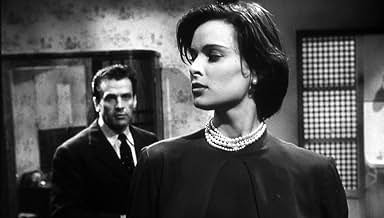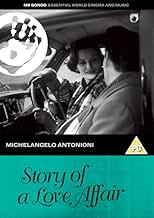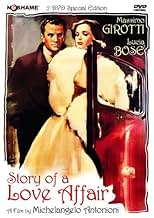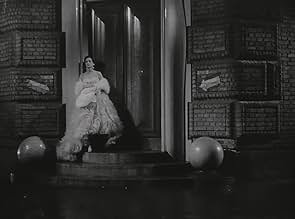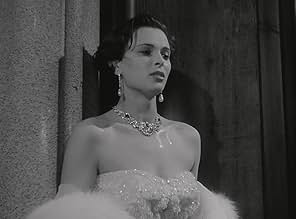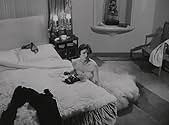IMDb रेटिंग
7.1/10
3.7 हज़ार
आपकी रेटिंग
अपनी भाषा में प्लॉट जोड़ेंPaola is a young, beautiful woman married to a wealthy entrepreneur. She meets her former lover Guido after seven years, but their relationship is marked by tragic events.Paola is a young, beautiful woman married to a wealthy entrepreneur. She meets her former lover Guido after seven years, but their relationship is marked by tragic events.Paola is a young, beautiful woman married to a wealthy entrepreneur. She meets her former lover Guido after seven years, but their relationship is marked by tragic events.
- पुरस्कार
- 2 जीत और कुल 1 नामांकन
Rubi Dalma
- L'amica snob di Paola
- (as Rubi D'Alma)
Rosi Mirafiore
- La cameriera del bar
- (as Rosi Mirafiori)
Franco Fabrizi
- Il presentatore della sfilata di moda
- (बिना क्रेडिट के)
फ़ीचर्ड समीक्षाएं
In Milano, when the wealthy and jealous entrepreneur Enrico Fontana (Ferdinando Sarmi) discovers hidden photos of his gorgeous twenty-seven year-old wife Paola Molon Fontana (Lucia Bosé), he hires a Neapolitan detective agency to investigate her past. Enrico, who owns twenty companies, married Paola during the war in March 1943 and her past is unknown to him. Detective Morale Carloni (Gino Rossi) is assigned by his boss to head to Ferrara, where Paola studied the technical school after leaving her hometown in Rovigo. During his investigation, the snoopy Carloni discovers that the teenager Paola dated many youngsters and her best friends were Matilda Calvani and Giovanna Carlini, who died seven years ago two days before her wedding with Guido (Massimo Girotti). He gets the address of Guido with Matilda's father but his wife sends a letter to Guido advising that the police was probing him. Guido travels to Milano, where he meets Paola after seven years to show the letter. When they see each other, their old passion reignites; but Carloni is still chasing the truth about the tragic accident with Giovanna.
"Cronaca di un Amore" is the first feature of the director Michelangelo Antonioni and his debut could not be better. This film noir has a magnificent cinematography in black and white and unusual and sophisticated angles of camera. The story is engaging, with the gorgeous nineteen year-old Lucia Bosé, who was Miss Italy 1947, in the role of a twenty-seven year-old fatal woman married with a rich industrial that left an old passion after a tragic accident and revives her love when they reunite seven years later. The romance is quite a comedy of errors, with the feeling of guilt of Paola and Guido affecting their love. Milano in the after war with few cars on the streets is also impressive. My vote is eight.
Title (Brazil): "Crimes d'Alma" ("Crimes of Soul")
"Cronaca di un Amore" is the first feature of the director Michelangelo Antonioni and his debut could not be better. This film noir has a magnificent cinematography in black and white and unusual and sophisticated angles of camera. The story is engaging, with the gorgeous nineteen year-old Lucia Bosé, who was Miss Italy 1947, in the role of a twenty-seven year-old fatal woman married with a rich industrial that left an old passion after a tragic accident and revives her love when they reunite seven years later. The romance is quite a comedy of errors, with the feeling of guilt of Paola and Guido affecting their love. Milano in the after war with few cars on the streets is also impressive. My vote is eight.
Title (Brazil): "Crimes d'Alma" ("Crimes of Soul")
Although Antonioni was part of the Italian Nouvelle Vague ,like Fellini,he began as a director of the neorealism school.He did not cut,however, the best of De Sica ,Rossellini and Visconti.
Best part comes from a sensitive Massimo Girotti but he's not really given a scene to shine -as he had in Visconti's "Ossessione" -.Lucia Bosé gives a good but a bit icily impersonal performance.
"Cronaca di un amore" is an interesting movie,if only for the things it forecasts: -the screenplay takes the shape of a private investigation,predating by ten years the second part of "l'avventura" and "blow-up" -the scenes displaying wealthy people living in luxury and exchanging futile conversations will be fully developed in "la Notte" But the most interesting subject is responsibility.Is a crime we intend to commit really a crime?This subject was rarely treated in Italian cinema ."Blow up" will come back to appearances .
Best part comes from a sensitive Massimo Girotti but he's not really given a scene to shine -as he had in Visconti's "Ossessione" -.Lucia Bosé gives a good but a bit icily impersonal performance.
"Cronaca di un amore" is an interesting movie,if only for the things it forecasts: -the screenplay takes the shape of a private investigation,predating by ten years the second part of "l'avventura" and "blow-up" -the scenes displaying wealthy people living in luxury and exchanging futile conversations will be fully developed in "la Notte" But the most interesting subject is responsibility.Is a crime we intend to commit really a crime?This subject was rarely treated in Italian cinema ."Blow up" will come back to appearances .
The feature film debut of future Italian cinema star Michelangelo Antonioni is quite conventional and straightforward as compared to his later works, which are generally regarded as masterpieces. Though not in that category, this film ranks as a very well-made melodrama that dares to also include exploration of the darkest of human desires, specifically within the context of marriage and fidelity.
Chance also plays a large role here, helping to reunite former lovers who pick up where they left off, ironically thanks to the woman's husband hiring a private detective to follow her as he suspects she is having an affair. What follows is often high-strung, dense and very moving as Antonioni shows us the most desolate shots of the beautiful city Milan. Many of the establishing shots are long shots of corridors, streets and other walkways that create great sense of alienation, isolation and illicit activities. The ending may require a bit of explaining but still fits the overall tone of elegy and bitter sadness. A powerful and moving Italian melodrama that certainly could be used as a template for American filmmakers today.
Chance also plays a large role here, helping to reunite former lovers who pick up where they left off, ironically thanks to the woman's husband hiring a private detective to follow her as he suspects she is having an affair. What follows is often high-strung, dense and very moving as Antonioni shows us the most desolate shots of the beautiful city Milan. Many of the establishing shots are long shots of corridors, streets and other walkways that create great sense of alienation, isolation and illicit activities. The ending may require a bit of explaining but still fits the overall tone of elegy and bitter sadness. A powerful and moving Italian melodrama that certainly could be used as a template for American filmmakers today.
Antononoi's first feature film deals with a jealous husband looking into the past of his wife, Paola, via private investigator, which inadvertently gets her back together with an old lover, Guido, who unlike the rich wife, is a poor, barely scraping by car salesman. Although the two seem to be in love with each other, the difference in economic status and Paola's marriage keep them apart. Also looming over them is the shadow of an "accident" they feel responsible for.
Many have called this a sort of noir, and it's easy to see why. Paola could be seen as bordering the line of a femme fatale, there's the past catching up, the grey morality of the characters, etc. However if one were to watch this alongside noirs like Double Indemnity, Laura, and Out of the Past, they would fine "Story of a Love Affair" feels completely different, and besides these tropes, hardly feels like a noir. It would be safer to say the film has noir elements.
Like a number of Antononoi's later works, the film deals with alienation, as well as the bourgeoise. The disenfranchised characters who easily fall into damning passions is present here. The plot is very intricate and the film is carried by mostly dialogue, as opposed to later films where imagery would play more prominence. Although not as grandiose as the cinematography from films like "The Adventure" and "la Notte", his touches can certainly be seen in this splendidly crafted first film.
Thankfully, the writing and characterization is more than enough to carry things here. The multitude of plot threads, characters and themes are woven masterfully, and while not featuring the most sympathetic characters in the world, they are certainly fascinating ones, and that's enough.
If you can find this and are a fan of these kinds of films, it's well worth checking out.
Many have called this a sort of noir, and it's easy to see why. Paola could be seen as bordering the line of a femme fatale, there's the past catching up, the grey morality of the characters, etc. However if one were to watch this alongside noirs like Double Indemnity, Laura, and Out of the Past, they would fine "Story of a Love Affair" feels completely different, and besides these tropes, hardly feels like a noir. It would be safer to say the film has noir elements.
Like a number of Antononoi's later works, the film deals with alienation, as well as the bourgeoise. The disenfranchised characters who easily fall into damning passions is present here. The plot is very intricate and the film is carried by mostly dialogue, as opposed to later films where imagery would play more prominence. Although not as grandiose as the cinematography from films like "The Adventure" and "la Notte", his touches can certainly be seen in this splendidly crafted first film.
Thankfully, the writing and characterization is more than enough to carry things here. The multitude of plot threads, characters and themes are woven masterfully, and while not featuring the most sympathetic characters in the world, they are certainly fascinating ones, and that's enough.
If you can find this and are a fan of these kinds of films, it's well worth checking out.
Suffering is an inate response to life, this is one of the inescapable principles of existence. Antonioni saw far in the career that followed, farther than perhaps any director in cinema, but here he begins where it's proper, with life as a cycle of suffering, a seemingly random pattern of recurring time where we're denied what we most desire, happiness eludes us and our dreams and hopes are thwarted and frustrated.
Too young to see a true reality, Antonioni nonetheless sees clearly the reality of illusions. First that the cycle we call life is not blindly, randomly spun, and that we're to be held accountable for our part in the spinning, foremostly that our pursuit of happiness as we like to think is really the deluded pursuit of satisfying desire.
The crucial point that connects these is, rather poignantly, a death, and it happens not once but twice, mirrored identical the second time like a prefiguration of Vertigo. As with Vertigo, this borrows the world of film noir to speak of karmic wheels and the mechanisms that control them, a Double Indemnity scenario where secret lover and wife calculate to get rid of the rich husband.
In a magical touch, the plotted murder happens of its own accord, seemingly out of the whim of an agent of a higher court passing by.
It's not then just a matter of what begins as thought and desire invariably manifests in imminent reality, this is a powerful inspection of mind, but moreover that having devoted themselves by all means to the pursuit of that desire, a passion born of ego and craving, the obstacle that stood in their way now removed, the two protagonists realize how impotent they remain to pursue that desire, how desire is by its nature an insatiable attribute. Their punishment, which is not divine but of their own doing, is the toll exacted on their conscience.
This first appearance in Antonioni of karma as the force that keeps going the cycle of suffering is not perfect by any means, it seems at the same time to imply questions of moral order, whether or not for example wishing for a crime to happen is a crime in itself, spiritual in nature. And all of this is more verbose than need be, something Antonioni would excise in a few years.
We find things in this debut that Antonioni would elaborate upon in wonderful ways, the ineffability of connection, the city as a cold, alienating limbo where souls in transit struggle for meaning, the transparent reality that extends outside the frame to suggest an entire world and flow of life with or without these characters (indeed we find here, abetting this, the beginnings of his amazing sound work, where the city traffic is always audible), but all these are in nascent form here.
What stands out for me is the true perception that begins to form in Antonioni's cinema. Meaning our idea of reality is just that, an idea born of our own habits and various storytellings, which clouds our soul and needs to be challenged, dismantled, removed from our eyes so that we can see life as it is.
Too young to see a true reality, Antonioni nonetheless sees clearly the reality of illusions. First that the cycle we call life is not blindly, randomly spun, and that we're to be held accountable for our part in the spinning, foremostly that our pursuit of happiness as we like to think is really the deluded pursuit of satisfying desire.
The crucial point that connects these is, rather poignantly, a death, and it happens not once but twice, mirrored identical the second time like a prefiguration of Vertigo. As with Vertigo, this borrows the world of film noir to speak of karmic wheels and the mechanisms that control them, a Double Indemnity scenario where secret lover and wife calculate to get rid of the rich husband.
In a magical touch, the plotted murder happens of its own accord, seemingly out of the whim of an agent of a higher court passing by.
It's not then just a matter of what begins as thought and desire invariably manifests in imminent reality, this is a powerful inspection of mind, but moreover that having devoted themselves by all means to the pursuit of that desire, a passion born of ego and craving, the obstacle that stood in their way now removed, the two protagonists realize how impotent they remain to pursue that desire, how desire is by its nature an insatiable attribute. Their punishment, which is not divine but of their own doing, is the toll exacted on their conscience.
This first appearance in Antonioni of karma as the force that keeps going the cycle of suffering is not perfect by any means, it seems at the same time to imply questions of moral order, whether or not for example wishing for a crime to happen is a crime in itself, spiritual in nature. And all of this is more verbose than need be, something Antonioni would excise in a few years.
We find things in this debut that Antonioni would elaborate upon in wonderful ways, the ineffability of connection, the city as a cold, alienating limbo where souls in transit struggle for meaning, the transparent reality that extends outside the frame to suggest an entire world and flow of life with or without these characters (indeed we find here, abetting this, the beginnings of his amazing sound work, where the city traffic is always audible), but all these are in nascent form here.
What stands out for me is the true perception that begins to form in Antonioni's cinema. Meaning our idea of reality is just that, an idea born of our own habits and various storytellings, which clouds our soul and needs to be challenged, dismantled, removed from our eyes so that we can see life as it is.
क्या आपको पता है
- ट्रिवियाMichelangelo Antonioni's feature film directorial debut. He wanted to cast Gene Tierney as Paola, but since he was an unknown European director he could not get her. Eventually he met then 19 year old Lucia Bosè, who had been Miss Italy 1947, while having lunch at fellow director Luchino Visconti's house. While initially skeptical over her maturity, Visconti convinced him to audition her.
- गूफ़After Paola says, "Leave me alone," the camera moves to follow her as she collapses onto her bed. In the upper right corner of the frame, a white drape can be briefly seen before it is pulled out of the path of the camera.
- कनेक्शनFeatured in Marco Ferreri 1928 - 1997 (2008)
टॉप पसंद
रेटिंग देने के लिए साइन-इन करें और वैयक्तिकृत सुझावों के लिए वॉचलिस्ट करें
- How long is Story of a Love Affair?Alexa द्वारा संचालित
विवरण
बॉक्स ऑफ़िस
- दुनिया भर में सकल
- $528
- चलने की अवधि1 घंटा 38 मिनट
- रंग
- पक्ष अनुपात
- 1.37 : 1
इस पेज में योगदान दें
किसी बदलाव का सुझाव दें या अनुपलब्ध कॉन्टेंट जोड़ें



